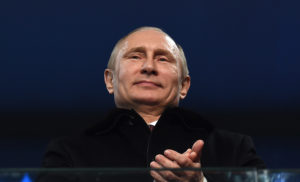When British politicians boast of their support for Ukraine, they reach for statistics: 1,550 individuals sanctioned, including 130 oligarchs; 180 companies targeted; £18 billion frozen. Those are big numbers, packing an impressive rhetorical punch, but they disguise a big problem: the UK doesn’t know what to do with it.
The dirty secret is that we were only able to sanction so much wealth because British governments have for decades welcomed Russian oligarchs, encouraged them to spend money here, and pointedly failed to question the origins of that wealth. By providing them with a safe haven for their money, and a playground in which to spend it, we have — in the manner of a particularly-obliging fence for stolen goods — encouraged them to steal evermore egregiously.
And if we were providing a safe haven for Russian oligarchs, we had no need to employ any investigators, which means — now we’ve suddenly changed our minds about the desirability of welcoming dirty money — we have no one sufficiently skilled or experienced to bring cases against them. So, all of this frozen money is in limbo, and its owners aren’t happy about it. The problems will start with legal challenges, the first of which is imminent. Eugene Shvidler is a Russian born UK-US citizen and, according to Forbes, is worth $1.7 billion. The British government sanctioned him last March because of his business ties with Roman Abramovich, saying that he was “involved in obtaining a benefit from or supporting the Government of Russia”, which his lawyers say is plainly unfair.
The case is due to be heard next month, and lawyers certainly sound like they’ve gearing up to bring more cases against the UK’s sanctions. “They are an act of war and a gross departure from the rule of law,” Robert Amsterdam, a partner at Amsterdam & Partners in London who has been working on high-profile oligarch-related cases for decades, told The Times. “Western governments have sanctioned Russians who have nothing to do with Putin and fail to understand that not all rich Russian businessmen are oligarchs and Putin cronies.”
Among the wealthy Russians with substantial amounts of wealth frozen in London are Andrei Guryev, fertiliser tycoon and owner of Witanhurst, the second-biggest house in the capital; Oleg Deripaska, the aluminium baron whose property on Belgrave Square was invaded by anarchists a year ago; Mikhail Fridman and Pyotr Aven, bankers who’ve tried using British lawyers to clear their names before; and, of course, Abramovich himself.
It’s easy to see why they might choose to employ their right to challenge the Government’s decision to freeze their assets. Sanctioned oligarchs have a “general licence” to use otherwise-blocked money to pay legal fees, which makes a court challenge a free hit: if you’re going to lose your wealth anyway, you may as well spend it on lawyers. Having imposed limits on dozens of oligarchs, as well as multiple banks, the Office for Financial Sanctions Implementation will be tied up in these cases for years, and ministers don’t know what to do about it. It’s politically impossible for ministers to cancel the sanctions, so the frozen property will become a legal piñata, showering fees down onto any lawyers prepared to give it a whack, and using up ever more of civil servants’ time.
And that risks distracting us from the most important question we need to ask, which is: why was £18 billion worth of suspicious Kremlin-linked property in Britain in the first place? The UK’s unique combination of a friendly tax regime, biddable politicians, luxury housing and under-resourced law enforcement agencies have made it a home from home for kleptocrats the world over. Unlike in the United States, where federal agencies prosecute financial criminals no matter how deep their pockets, cash-stripped British investigators are vanishingly unlikely to probe the wealth of anyone able to afford a good legal team.
The Government has brought in new legislation over the past year to close some of the worst loopholes in our financial system. It is no longer possible for the ownership of UK properties to be hidden behind offshore shell companies; or for anonymous UK companies to be used to launder money through foreign bank accounts. And that is welcome. However, despite ministers’ claims, they have done nothing to change the core problem, which is that they don’t have enough officers to enforce the laws that politicians pass. Officers at the National Crime Agency are funded at a third of the level of their counterparts at the FBI, and the same is true at lower levels of policing. Financial crime is 41% of all crime committed in the UK, yet receives less than 1% of police resourcing.
Sanctions are law enforcement on the cheap. Yes, they result in assets being frozen, but only because politicians say so, not as part of a legal investigation, which means they don’t result in prosecution, conviction and confiscation. Sanctions don’t lead anywhere: they’re like an aircraft carrier with no planes; or a government construction programme, which never builds any actual hospitals. Yes, they have a propaganda value, but if we wish to move from freezing assets to seizing them, we come up against the consequences of our decades-long failure to invest in law enforcement.
As one official at the National Crime Agency told me laconically: “The lawyers have a look and say to the director general: ‘worst case scenario, this could cost us a billion’. If you’re the DG and your budget is £800 million, that will give you pause for thought.” Whichever agency you pick – the NCA, the Serious Fraud Office, the Metropolitan or City of London Police forces — you find the same picture: it’s under-staffed, under-resourced and under-motivated. Experienced investigators are continuously being poached by City firms keen to staff their compliance departments, which are able to offer more money and less stress. A senior detective joked to me last month that he was pitching his agency to graduates with the promise that “if you work for us, you’ll walk into a job at HSBC in three years’ time”.
In an attempt to ensure its limited resources are used effectively, six years ago the Government created the National Economic Crime Centre. But without sufficient resourcing, it has failed to deliver the “step-change” politicians promised, and instead just issues press releases announcing things that would have happened anyway. Grumpy officers now grumble that its NECC acronym really stands for “National Experts for Claiming Credit”.
Investigating kleptocratic wealth is hard at the best of times: its owners’ identities are hidden behind shell companies in multiple jurisdictions, and are protected by the world’s finest lawyers. When the NCA did bring a case against houses owned by the daughter and grandson of the former president of Kazakhstan, its lawyers were eviscerated by opponents from City gunslingers Mishcon de Reya, ably assisted by the near-bulletproof Panamanian shell structures through which the property was owned. Meanwhile, prosecutors seeking evidence of how wealth has been stolen have to rely on counterparts in the kleptocrats’ home countries, where crooked police officers will not give evidence against their own bosses.
The situation is exacerbated by the fact that Britain’s already-stretched officers have two competing demands: first, they have to investigate the wealth brought into our country during the decades-long “no questions asked” period; and secondly, they have to prevent more wealth joining it from other countries plagued by kleptocratic elites, whether they’re elsewhere in the former Soviet Union, in the Far East, South Asia, Africa or elsewhere. London’s new Nine Elms district is just the most visible example of developments built to attract hot money from Far Eastern investors, much of which will be as questionable as the Russian money we welcomed in the past.
And so the sanctioned Russian wealth is stuck. It cannot be confiscated, because the UK lacks the investigative firepower to bring solid cases to court; but it cannot be released, because to do so would strengthen Vladimir Putin, an indicted war criminal. This stalemate benefits no one, except the lawyers who are paid to maintain it.
Is there a way through? Possibly. But to find it we first need to ask what problem the sanctions were designed to solve. Before February 2022, the threat of them was intended to dissuade Vladimir Putin from attacking Ukraine at all, a task at which they self-evidently failed. When war began, sanctions were employed to deny the Kremlin access to money it could use to fight its war by freezing it in place. That aim has been achieved, but risks being undone if successful legal challenges reduce the amount of wealth that is frozen. Officials now talk about a new aim, which is to confiscate the frozen wealth, and to use it to help Ukraine rebuild its bridges, roads, houses, schools, hospitals, power stations and factories.
Last July, Canada passed a law allowing its government to seize sanctioned assets, in order to help Ukraine and compensate Putin’s victims. In December, it began a confiscation process against wealth owned by one of Abramovich’s companies under this new simplified procedure. Here the Canadians have offered a path for us to follow. It feels wrong to take property away without a court proceedings, but leaving the money in limbo risks it being dissipated in legal fees like a super-charged 21st-century Jarndyce v Jarndyce. And perhaps, if we can confiscate some of this property, we’ll help ourselves too: we’ll cool our super-heated housing market; we’ll drive dirty money out of politics; and we’ll prevent new Putins from building new kleptocracies.
Disclaimer
Some of the posts we share are controversial and we do not necessarily agree with them in the whole extend. Sometimes we agree with the content or part of it but we do not agree with the narration or language. Nevertheless we find them somehow interesting, valuable and/or informative or we share them, because we strongly believe in freedom of speech, free press and journalism. We strongly encourage you to have a critical approach to all the content, do your own research and analysis to build your own opinion.
We would be glad to have your feedback.
Source: UnHerd Read the original article here: https://unherd.com/



